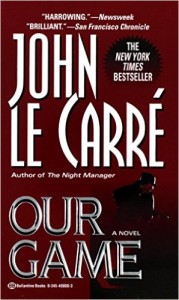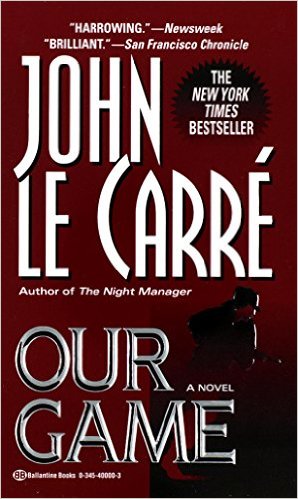
At the peak of his game, nobody writing espionage novels can match John le Carré. However, like anyone, he can’t always operate with all cylinders firing. The proof of that lies in Our Game, first published in 1995. Though the novel is worth reading for what it reveals about life inside Britain’s intelligence establishment, it falls far short of most of his other works, especially 1963’s The Spy Who Came in from the Cold, his breakthrough novel and still probably his best known.
British espionage from the inside out
Our Game is slow to get off the ground and proves tedious for extended periods before the final chapters, when the most dramatic action takes place. The narrator, Timothy (Tim) Cranmer, is a retired senior officer in what is either MI5 (the UK’s domestic Security Service) or MI6 (Secret intelligence Service). It’s hard to tell which, because the same agency appears to operate both inside and outside British borders. (Le Carre worked for both in the 1950s and 60s, before he turned to writing fiction.) In the context of this book, the distinction doesn’t seem to mean much. The novel is about what in the U.S. we might call “inside baseball.”
Our Game by John le Carré ★★★☆☆
A central character who talks too much
Cranmer is content to make wine at the vineyard he inherited from a wealthy uncle, where he lives with his much younger mistress, Emma, a free spirited musician and composer. The peaceful world they inhabit is upended when Cranmer’s star double agent, Dr. Lawrence Pettifer, disappears from his post at Bath University and is nowhere to be found. Though Cranmer narrates the story and plays a central role within it, it’s Pettifer who sucks up the reader’s attention. A brilliant and charming man, Pettifer who is frighteningly articulate, witty, compulsively talkative, and quick on the draw, even in the most stressful circumstances. Perhaps there are Britons who talk like this. I’ve never met one.
British espionage at the end of the Cold War
The novel unfolds in a series of flashbacks interspersed with present-tense narrative. The action takes place in the years immediately following the end of the Cold War with the collapse of the USSR. It quickly becomes apparent that Cranmer is suspected both by his former employers and by the British police of colluding with Pettifer in an elaborate scheme to embezzle a huge sum of money from the Russian embassy. Though neither the police nor the intelligence agency is aware of it, Emma has also disappeared, probably with Pettifer — and Cranmer’s pursuit of the truth about what happened is motivated more by his obsessive love for her than by his concern for his long-time agent, with whom he has had what might be termed a love-hate relationship.
About John le Carré
It’s well known that John le Carré is the pen name of David Cornwell, son of a notorious con man. Wikipedia cites a biographer of the author to this effect: “His father, Ronnie, made and lost his fortune a number of times due to elaborate confidence tricks and schemes which landed him in prison on at least one occasion. This was one of the factors that led to le Carré’s fascination with secrets.” He has written nearly two dozen novels, all but two of them about British espionage in the Cold War era.
For more great reading
I’ve reviewed The Spy Who Came In From the Cold and four other spy novels by John le Carré:
- The Spy Who Came In From the Cold by John le Carré (Is this the best spy novel ever written?)
- A Legacy of Spies (The Cold War reexamined in John le Carré’s terrific new novel)
- Our Kind of Traitor (The spy who never left the cold)
- Silverview (A nostalgic look at espionage from John le Carré)
You might also enjoy my posts:
- The 15 best espionage novels
- Good nonfiction books about espionage
- The best spy novelists writing today
- Top 10 mystery and thriller series
If you enjoy reading history in fictional form, check out 20 most enlightening historical novels. And if you’re looking for exciting historical novels, check out Top 10 historical mysteries and thrillers.
And you can always find my most popular reviews, and the most recent ones, on the Home Page.



























